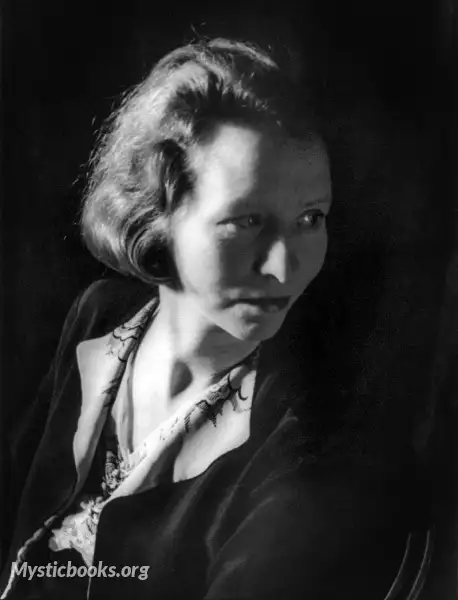
Timeline
Title
Country/Nationality
Edna St. Vincent Millay
Edna St. Vincent Millay was an American lyrical poet and playwright.
Encouraged to read the classics at home, she was too rebellious to make a success of formal education, but she won poetry prizes from an early age, including the Pulitzer Prize in 1923, and went on to use verse as a medium for her feminist activism. She also wrote verse-dramas and a highly praised opera, The King's Henchman. Her novels appeared under the name Nancy Boyd, and she refused lucrative offers to publish them under her own name.
Millay was a prominent social figure of New York City's Greenwich Village just as it was becoming known as a bohemian writer's colony, and she was noted for her uninhibited lifestyle, forming many passing relationships with both men and women. She was also a social and political activist and those relationships included prominent anti-war activists including Floyd Dell, editor of the radical magazine The Masses, and perhaps John Reed. She became a prominent feminist of her time; her poetry and her example, both subversive, inspired a generation of American women.
Her career as a poet was meteoric. In 1923 she became the first woman to win the Pulitzer prize in poetry. She became a performance artist super-star, reading her poetry to rapt audiences across the country.
A road accident in middle-age left her a partial invalid and morphine-dependent for years. Yet near the end of her life, she wrote some of her greatest poetry.
Millay was born in Rockland, Maine, to Cora Lounella Buzelle, a nurse, and Henry Tolman Millay, a schoolteacher who would later become a superintendent of schools. Her middle name derives from St. Vincent's Hospital in New York, where her uncle's life had been saved just before her birth. The family's house was "between the mountains and the sea where baskets of apples and drying herbs on the porch mingled their scents with those of the neighboring pine woods." Edna's mother attended a Congregational church. In 1904, Cora officially divorced Millay's father for financial irresponsibility and domestic abuse, but they had already been separated for some years. Henry and Edna kept a letter correspondence for many years, but he never re-entered the family. Cora and her three daughters – Edna (who called herself "Vincent"), Norma Lounella (born 1893), and Kathleen Kalloch (born 1896) – moved from town to town, living in poverty and surviving various illnesses. Cora travelled with a trunk full of classic literature, including Shakespeare and Milton, which she read to her children. The family settled in a small house on the property of Cora's aunt in Camden, Maine, where Millay would write the first of the poems that would bring her literary fame.
Millay died at her home on October 19, 1950. She had fallen down stairs and was found approximately eight hours after her death. Her physician reported that she had suffered a heart attack following a coronary occlusion. She was 58 years old. She is buried alongside her husband at Steepletop, Austerlitz, New York.
Books by Edna St. Vincent Millay

A Few Figs from Thistles
Millay's second collection of poetry, originally published in 1920 with 15 poems and then expanded with 8 more by the 1922 edition. She wrote them while living in the bohemian West Village. Almost all poems reflect a free-spirited young woman unwilli...

Grown-Up
Edna St. Vincent Millay was an American lyrical poet and playwright. She won poetry prizes from an early age, including the Pulitzer Prize in 1923, and went on to use verse as a medium for her feminist activism. She also wrote verse-dramas and a high...

Recuerdo
LibriVox volunteers bring you nine different recordings of Recuerdo, by Edna St. Vincent Millay. This was the weekly poetry project for the week of July 16th, 2006.(Summary by Annie Coleman)

Singing-Woman from the Wood's Edge
LibriVox volunteers bring you eight different recordings of The Singing-Woman from the Wood's Edge, by Edna St. Vincent Millay, to celebrate Halloween. This was the weekly poetry project for the week of October 29th, 2006.
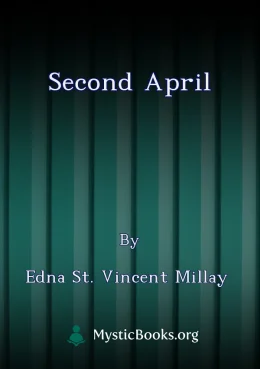
Second April
A collection of poems by Edna St. Vincent Millay.
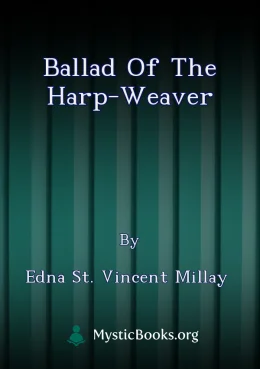
Ballad of the Harp-Weaver
LibriVox volunteers bring you 7 different recordings of The Ballad of the Harp-Weaver by Edna St. Vincent Millay.

Renascence and Other Poems
The following is a recording of the first volume of poetry published by Edna St. Vincent Millay. When the author had graduated from high school, she couldn't afford to go to college. In the summer of 1912, Vincent's sister, Norma, found work as a wai...

Poems
This volume gathers poems by Edna St. Vincent Millay, published in 1923, the year she became the third woman to receive the Pulitzer Prize for Poetry. The collection features a range of lyrical poems, showcasing Millay's mastery of form, particularly...

Penitent
This poem, "The Penitent" by Edna St. Vincent Millay, is a playful and witty exploration of a young woman's seemingly guilt-free conscience. The poem's tone is lighthearted and even slightly irreverent, reflecting Millay's signature style of blendin...
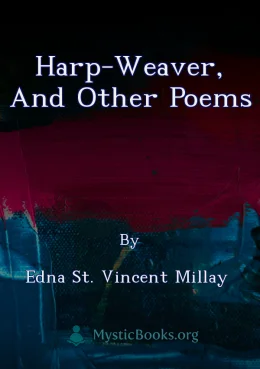
Harp-Weaver, and Other Poems
This collection of poems by Edna St. Vincent Millay showcases her mastery of lyrical verse, exploring themes of love, loss, nature, and the human condition. The poems are characterized by their musicality, their evocative imagery, and their explorat...
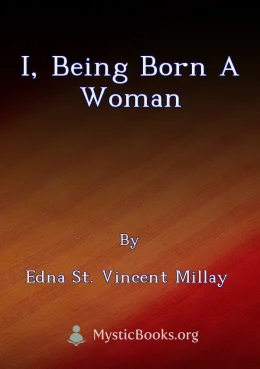
I, Being Born a Woman
This collection of poems by Edna St. Vincent Millay explores themes of femininity, love, and societal expectations in the early 20th century. Known for her lyrical style and poignant observations, Millay uses vivid imagery and introspective language...